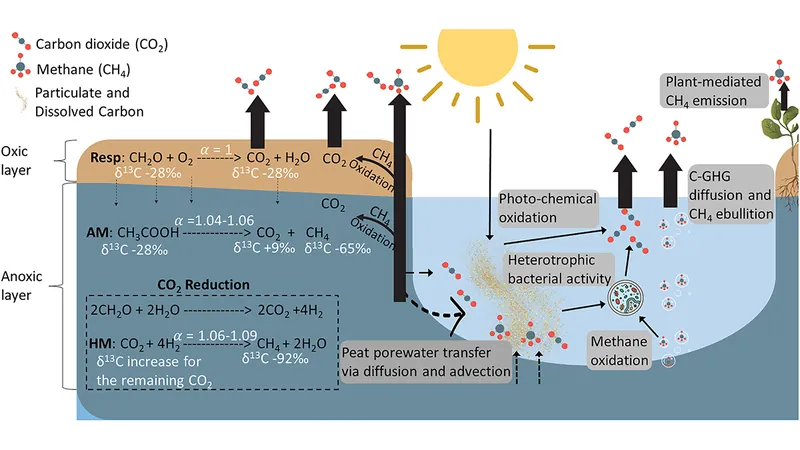
Southeast Asia's Peatland Plantations: Unveiling the Carbon Crisis!
2025-03-26
Author: Wei Ling
Introduction
In a shocking revelation, nearly 41% of Southeast Asia's vital peatland forests have been drastically altered due to land-use changes, with tree plantation conversions taking center stage as a prevalent practice. These transformations have alarming implications for our planet's climate, yet comprehensive data surrounding their greenhouse gas emissions and production remains scarce.
Groundbreaking Study
A groundbreaking study by researchers led by Taillardat et al. (2025) provides critical insights into the carbon dynamics within these ecosystems. The team meticulously measured the carbon composition, concentration, and age in both water and soil at an industrial, short-rotation Acacia plantation in Sumatra, Indonesia. Astonishingly high levels of dissolved organic carbon, along with elevated concentrations of carbon dioxide and methane, were detected in porewater and drainage systems, categorizing these plantations as significant carbon hotspots.
Environmental Implications
What does this mean for the environment? The research reveals that the carbon found in these ecosystems is not just recent; it includes century-old carbon trapped within the peat. This unfortunate reality underscores the hazardous intersection of high plantation productivity and the exposure of ancient, carbon-rich substrates due to land conversion. Essentially, these plantations become ticking time bombs, releasing historical carbon back into the atmosphere and exacerbating climate change.
Call to Action
As global leaders and policymakers grapple with strategies to mitigate climate change, understanding the role of peatland plantations is crucial. If current trends continue, we may witness a dramatic increase in greenhouse gas emissions from these areas, challenging international climate goals and affecting biodiversity.
Conclusion
This pivotal study sheds light on the urgent need to reevaluate land use practices in Southeast Asia and calls for immediate action to protect and restore these priceless ecosystems before it's too late. With its findings, we are urged to rethink our approach to agriculture, conservation, and climate action. What’s next for the world as we face this burgeoning carbon crisis? Stay tuned as we continue to unravel the implications of this pressing environmental issue!




 Brasil (PT)
Brasil (PT)
 Canada (EN)
Canada (EN)
 Chile (ES)
Chile (ES)
 Česko (CS)
Česko (CS)
 대한민국 (KO)
대한민국 (KO)
 España (ES)
España (ES)
 France (FR)
France (FR)
 Hong Kong (EN)
Hong Kong (EN)
 Italia (IT)
Italia (IT)
 日本 (JA)
日本 (JA)
 Magyarország (HU)
Magyarország (HU)
 Norge (NO)
Norge (NO)
 Polska (PL)
Polska (PL)
 Schweiz (DE)
Schweiz (DE)
 Singapore (EN)
Singapore (EN)
 Sverige (SV)
Sverige (SV)
 Suomi (FI)
Suomi (FI)
 Türkiye (TR)
Türkiye (TR)
 الإمارات العربية المتحدة (AR)
الإمارات العربية المتحدة (AR)